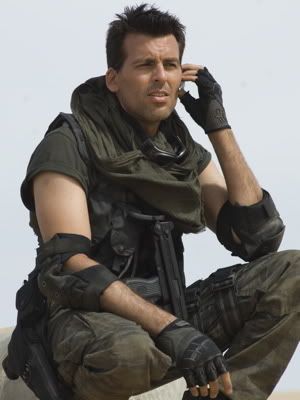
Instead of manning-up and actually going the emotionally hard route of being outrightly rejected by publishers, I’m rejecting them first and allowing you to give my entire book a preview, let you read the whole thing or, if you like, download the whole damn thing at no cost. Download and read my first book “Thank You, Goodnight†for FREE.
You can’t help but see it as a duality.
With Oded Fehr’s career in Hollywood working out in the exact opposite direction that most other actors build their resumes, his stints in THE MUMMY pictures thrusted him to the front of the line of big budget productions, Oded found himself being quickly established within the acting community. He took his notoriety and actually channeled it into smaller roles on television. This part is important to understand because from Presidio Med, Charmed and even UC: Undercover Oded two-stepped back into the thunderous actioneer, RESIDENT EVIL: APOCALYPSE without so much as missing a beat.
Too many times in this business you talk to people who are vocal about being film actors and nothing but or television actors that only sees television as a way into film. Oded, I think, doesn’t see things that way. As evidenced by his turn in Sleeper Cell on Showtime you can see Oded deliver a tightly packed performance that is definitely an argument as to why film actors need to rethink their stance on the issue.
I believe the other part of this duality about Oded, and this could be pure speculation, is when he’s going to break from playing characters with obviously “international” names like Prince Sadir, Kazim, Amahl Ali Akbar, Zankou, et al. Hopefully you can see where this is leading when you understand that, as Carlos Olivera in the newest RESIDENT EVIL installment, his newest role is yet another step forward for the actor who is constantly looking for roles that will allow him to be seen as an actor who can play roles of varying type.
I talked with Oded regarding the choices he makes with regard to work, whether he’s had it up to here with productions set in the sand and what it’s like to be a working actor with small children.
RESIDENT EVIL: EXTINCTION opens Friday.
ODED FEHR: Hi…is this Christopher Stipp? This is Oded Fehr.
CHRISTOPHER STIPP: How are you doing?
FEHR: I’m very good, how are you?
CS: I’m doing fine. I couldn’t wait to talk to you.
FEHR: I appreciate that.
CS: I know you’ve already been through rounds and rounds and rounds of press and all that…
FEHR: Yeah, but it’s not so bad.
CS: No?
FEHR: I like to talking about movies and the work.
CS: The only reason I bring that up is because I recently saw an interview with Kevin Bacon talking about doing press and junkets and what he thought of junkets. Being on the other side I’ve got to think that answering the same questions again and again and again…
FEHR: The junket days are definitely hard. They are a little bit mind numbing because you literally do answer the same questions over and over and I think it gets to the point where the day you can sum up all the answers right off the bat from the first one.
CS: I am absolutely fascinated by that only from your point of view. Obviously in the back of your head you want a memorable, a nice conversation…is there things you look for – hope that somebody brings up instead of the “What was it like to work with” kind of questions?
FEHR: No, I was thinking about it myself; what would be the questions that would be most interesting? It’s one of those things that when you are on your side, you know your work really well and sometimes you are surprised by questions some people ask you as far as your work because it’s not the first thing you think of. It is the same with me. I don’t necessarily – I’m surprised by the questions or I’m not surprised by the questions. As far as I’m concerned I always afraid I’m boring people. Because I’m not really – I live a very simple life. I’m a father first, husband and so on so I’m not nearly as interesting as others might be.
CS: Well, you are to me because I have two girls at home, one’s four and one’s one so when I saw that you had two children of your own.
FEHR: Exactly the same ages.
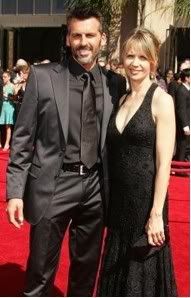 CS: I was utterly fascinated from the point of view that your world must have changed dramatically. You have a preconceived notion of what life will be like when you say “I am going to be a father and having to balance”…Obviously, at the end of the day, acting is work.
CS: I was utterly fascinated from the point of view that your world must have changed dramatically. You have a preconceived notion of what life will be like when you say “I am going to be a father and having to balance”…Obviously, at the end of the day, acting is work.
FEHR: It is very much that. The thing about me I think is I was always very ready to have children and looked forward to having children and a family. My wife and I got married and really found a wonderful life with each other and we added it on with children and it never….you know how people always warn you everything will be so different. Everything is upside down, life is completely different and shocking but for it me it always felt as though it was very much a natural progression of things. I love it. It’s the first and foremost most important thing in my life.
And acting is definitely a job. It’s the most wonderful job. I’m the luckiest person on earth to have such a great job and to be able to sustain our life with it… It’s definitely a job. It’s one of those things…no body can touch me. If somebody doesn’t want me for a certain role or if somebody doesn’t like the work I do it doesn’t really affect me as far as who I am – it just affects me as I just had a bad day at work. Do you know what I mean?
CS: Absolutely. I looked at the shoot you did for the latest RESIDENT EVIL. I thought it said something about 55 days or something to that affect. Almost two months. Does that come into the picture now? All these years now of not having children and now you do…or is it “This is what I have to do to be a working father”?
FEHR: You know what? The thing about RESIDENT EVIL was that it was a wonderful shoot for me because we shot most of it in Mexicali which is four hours away. It all definitely, definitely comes into play with my family and I like to bring my family with me whenever I can. I just shot a movie up in Vancouver and spent three and a half weeks away from the family which is extremely difficult but then they came up for the final two weeks. I always have them come join me whenever possible. But, as far as RESIDENT EVIL was concerned, it was great, I used to drive home. Any time I would have at least 24 hours, I would drive home four hours just to see them and drive four hours back. But it was totally worth it. My daughter was only a month and a half old. We went through quite a lot to have her in the sense that my wife was on bed rest for a few months and actually hospitalized for seven weeks. It was really hard.
CS: Oh my…
FEHR: But we have a beautiful baby girl. It was totally worth it. It was great. I had a wonderful time in all aspects of RESIDENT EVIL: EXTINCTION.
CS: One of the first really big questions I have is after looking at the stuff you’ve done for the MUMMY and now RESIDENT EVIL…the kinds of shoots that they were, I’m just curious – are you just sick of filming in the sand?
(Laughs)
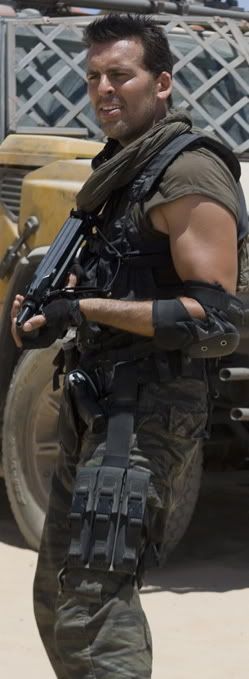 FEHR: Ha ha, no. I do love it. I’m naturally drawn more to heat than cold. I have a much better time being in 125 degrees than being in zero degrees. I really enjoy it. Personally I think it just looks so fantastic. It looks amazing, that kind of natural beauty you get with dunes, the rolling sand hills, it just the earth colors is extremely beautiful. Very sexy, very adventure like. I think Milla looks better than she ever looked in anything I’ve seen her in. It’s just very exciting and a lot more adventure like.
FEHR: Ha ha, no. I do love it. I’m naturally drawn more to heat than cold. I have a much better time being in 125 degrees than being in zero degrees. I really enjoy it. Personally I think it just looks so fantastic. It looks amazing, that kind of natural beauty you get with dunes, the rolling sand hills, it just the earth colors is extremely beautiful. Very sexy, very adventure like. I think Milla looks better than she ever looked in anything I’ve seen her in. It’s just very exciting and a lot more adventure like.
CS: Right, in fact you are leading right into the second thing I was going to bring up. You mentioned the word adventure-like and these movies just lend themselves to feeling sort of epic and I’m just curious from your side of things if there were things you have to do as an actor sort of embody that largess, that bombast of an adventure movie that you need to do. This is not a tiny role. You really have to play it up as it is.
FEHR: Yeah, I mean you try to do everything you can as far as building up the emotional depth of the character in these kinds of movies is not nearly as much work as you would do in a show like Sleeper Cell or Hamlet. But this movie is a lot more passion driven. I certainly spent three months or so working out, trying to build up more, trying to look like someone who is a hired killer, a fighter kind of thing, you know, soldier for hire. Definitely attempted at the same time to loose a lot of fat. Get that lean look – lean and hungry look of someone who is living in a post-apocalyptic world. You try to do a lot more physical stuff in these kinds of movies.
CS: Does anything surprise you anymore as to what these writers are coming up with as far as premises for these movies? Does anything go “Oh God…†You say the words post-apocalyptic, a lot of snobs, for lack of a better word would turn up their nose…
FEHR: I can’t see anybody turning up their nose or doing any of that with this kind of movie anyway in the sense that this is very much a genre of movie that snobs I don’t think would even look at. It’s the third installment in a genre of a move that was created from a video game and, truthfully, I think it was very well done.
The only other ones that might come close even though I think this is more truthful to the game is Laura Croft. And the thing about this one I believe is that the script is better than the last two, definitely the location, the details. I other two were great it’s just a nice progression, a nice build up from one movie to the next and I definitely think this is the best of all three. It has a lot more of that adventure feel just because of where it’s shot and all the other characters that have been added to it. It has a MAD MAX kind of feel in the sense of what’s left of the world. I think it’s one of those things that’s in all our minds. Are we going to bring this world to an end one day and only a few of us will survive.
CS: When you were reading the script for the third one – and I’m really curious to know – that when you are reading a script, even before one frame is shot, was it detailed enough that you could actually see how these individual parts evolve or have evolved since the last film or is there a lot of imagination you have to posses to try and envision if the movie is going to be schlocky?
FEHR: I think one of the hardest things for any actor, actually, not in my case with this one, if an actor is reading a script and is going to read for a certain part – your interpretation of what it is and the director’s interpretation could be two totally different things. That being said, reading this one after shooting the second one and seeing the first one you kind of have an idea of what it is that we’re talking about. And it was very clear in the script the vision, the totally different style from the last ones in the sense of the location, where it’s taking place and what the world looks like now. The fact is that the movie happens mostly in daytime, outdoors. The other movies were very much in the dark and felt very closed. So all of that is very different. It read much bigger obviously, bigger sceneries, bigger everything.
You can tell but you never have that 100% vision of the director. You don’t know where he’s going to take it or how he’s going to take it to shoot certain things. Even when you are shooting it you can’t 100% tell what it’s going to look like. You can see with your own eyes and every once in a while you look in a monitor but you still have no idea what it will look like after somebody adds the special effects to it. That’s where it takes me a few times to watch the movie and actually enjoy the story line because what I do the first few times is just go, “Oh my gosh, that is what it looks like, or wow they did that, the girls look fantastic, oh they added”…..And that’s how you watch the whole thing and you go through it and what your remember is so different.
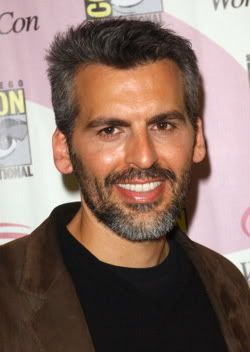 CS: It’s funny you bring that up. Some people don’t like to – it’s an odd thing – I encounter some people like to watch what they do, some people say I’ve filmed it and move on and feel very uncomfortable looking at it. But it doesn’t seem like you have a problem with that.
CS: It’s funny you bring that up. Some people don’t like to – it’s an odd thing – I encounter some people like to watch what they do, some people say I’ve filmed it and move on and feel very uncomfortable looking at it. But it doesn’t seem like you have a problem with that.
FEHR: I don’t particularly enjoy watching myself. It’s probably the same feeling you must have when you leave a message on your phone. You hear your voice and say oh my gosh, do I really sound like that? 10 times worse.
CS: But you’re a nice looking guy, aesthetically speaking…
FEHR: You’re part of a project – and I’m interested in directing one day and I am fascinated by seeing how the complete picture comes together.
CS: Funny you bring that up that you wanted to direct. You mentioned that the MUMMY mostly made your career what it is but most people work in the opposite direction with actors eventually leading to the big time, big budget role. But right out the gate you’ve done the big budget movie. What have you done to try and get the kind of roles like Sleeper Cell to demonstrate your range and that you are not just a big action go-to guy?
FEHR: I wish I could tell you that it’s as easy as oh this is what I want to do and this is what I’m going to do. It never is. The business has become very difficult out there. It’s much harder to get work. You can tell. Huge stars are doing TV shows and you never expect them doing. A very small percentage of actors are in a position that they can shoot exactly what they want to do and even they don’t get the opportunity unless they develop it themselves. So I can’t say that I just chose what I want. On the other hand, I do say no a lot. If there is something that I like, something that I read that I enjoy, for me, 99% of the time it’s the script. If it is something I enjoy – no matter what genre it is in. I’m happy to do it. I do try to do as many different things as I possibly can. DEUCE BIGALOW is a comedy and I’d love to do more comedy and always keep my eye out for a nice comedy to be a part of. Many times I’ll do tiny roles like in DREMER for the opportunity to work with people like Kurt Russell and Kris Kristofferson. So you just try to not do actual crap. (Laughs) But sometimes you just can’t help it for whatever reason. Most of the time you try to do things you enjoy reading.
CS: I’d like to ask you – when I was going through your resume a lot of the roles that you played with the exception of the work you did with UC Undercover, your characters names have a very international, ethnic sort of ring to it, is there any sort of frustration on your part, maybe there wasn’t or isn’t…
FEHR: There was a little bit in the beginning, obviously. The MUMMY was a wonderful thing on one hand – a double edge sword because it was difficult for anyone to see beyond the long hair, the beard, and the Arab accent. But that being said not being in the TV world there is no – I just did a pilot for Fox last season which I play a doctor…
Truthfully, it’s one of those things, you have to, whenever you sell anything whether it’s a product or you as an actor you really have to stand with your feet on the ground and be aware of what it is the people perceive your product is to be. And if your biggest advertisement shows the product as an Arab character it’s going to be hard for anyone to see you as anything else. You have to think of yourself – when you see an actor do something that you really enjoy you immediately think of him doing another 15 roles which are exactly the same. Your natural inkling is not to put him in a completely different genre. It a natural thing and you try to keep in mind. I’ve turned down many, many Arab roles. When Sleeper Cell came first, I just read a description of being offered a role of the head terrorist of a terrorist cell the first thing I said was “No, I don’t want to do it” but my representative said “Just read the script” and when I read the script there was no way I could turn it down. It was absolutely wonderful.
CS: I think it was one of your best work. I absolutely agree.
FEHR: And I would have to agree with you. It’s the best thing I’ve ever done. It was an amazing experience all around – working the directors we worked with, the cast, the crew, the writers everything. It was almost a family working together to achieve the same goal. It was great.
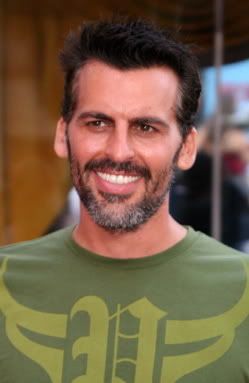 CS: And what did you bring away from that experience? Because it seemed that it was you, just you, just your acting – it wasn’t this bombastic – it wasn’t this large character we’ve come to know. What did it teach you about what you can do with a tiny role?
CS: And what did you bring away from that experience? Because it seemed that it was you, just you, just your acting – it wasn’t this bombastic – it wasn’t this large character we’ve come to know. What did it teach you about what you can do with a tiny role?
FEHR: I think it is extremely difficult to say what exactly it is. You learn about the acting aspect about what you can take away for the next time. It’s an internal thing. All of a sudden when you are doing another character you just find it easier to be natural with it.
All I know is that it was extremely important to me that this character be real – somebody that could be your neighbor. I felt that I definitely did not want to do some kind of Hollywood bad guy type of character. I wanted to do somebody who is just somebody that you almost, had it not been for the things he did or does, you’d really like the guy. And that’s what I was going for so therefore he had to be extremely natural just very much driven by his ideals and beliefs and he’s 100% convinced that he was doing the right correct thing. So basically, that’s what I was going for. I don’t think I’ve had the opportunity to play somebody for that length and depth that is so natural and I think I’ve learned a lot from it.
CS: One more question – going forward where I didn’t see anything else coming up on your horizon but certainly as you are contemplating moving forward as a working actor what are some of the things you are hoping to do with your next project and the next one after that? Is there any career path that you want to try to build on going forward?
FEHR: Well, I just shot a movie with Melissa George up in Vancouver, directed by Amanda Gusack. It’s a very small independent movie for MGM and that was a lot of fun. I’ve never done an independent before. I can’t tell you anything specific.
I do know that one of my dreams after leaving drama school was to do Shakespeare on stage one day. I come from a very classical type of training and for me that was the biggest challenge as a student actor entering drama school because I knew practically nothing about Shakespeare any of that classical theatre and really learn the language and all that. It was a huge challenge for me and still would be a huge challenge. I would love to conquer that one day by doing some sort of a Shakespeare play. Obviously the problem with that is the commitment it so long that you have to be in a place in your career that you could be taken away for practically a year. But I’d like to do anything – anything that’s good. I really enjoy doing TV – great TV. I enjoy doing film. I don’t really have anything specific. I just hope for great scripts. They are so scarce.
CS: I was just going to say, there are some people, some actors who say I’m just a film actor or look at television in a different way – not that it’s a lesser form but just something they do not want to do.
FEHR: It’s rare today that actors do that. There is a very small percentage of actors who do film only. Television today – the quality of TV – the quality of the story line, writing, the filming, the directing, all of it is so advanced – is so close to film now. The challenge on TV nowadays, in my opinion, is as good if not better than film it’s just that you have 8 days to shoot an episode instead of five months to shoot an hour and a half which is a huge difference.
CS: Oded, thank you so much for your time.
Special thanks to MAS for the transcription assist.
Comments: None
Leave a Reply |








